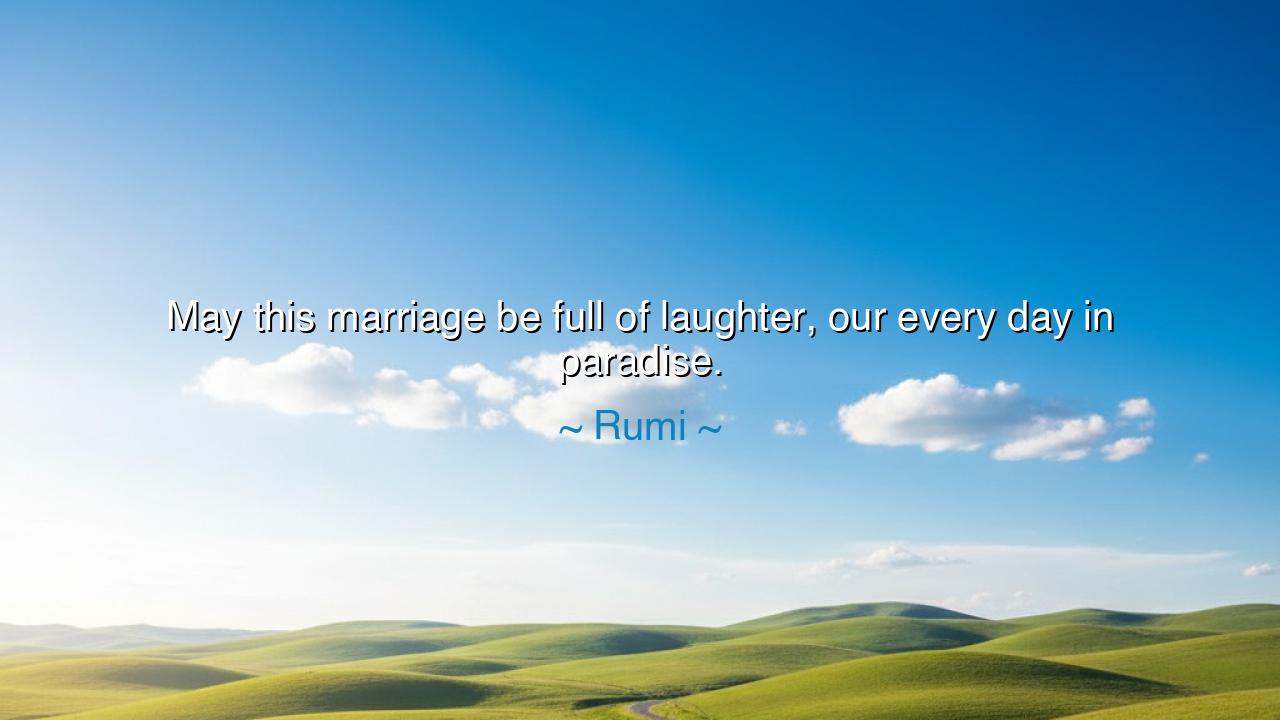
May this marriage be full of laughter, our every day in paradise.






In the luminous words of Rumi, the mystic of love and the poet of the soul, we hear the eternal blessing of union: “May this marriage be full of laughter, our every day in paradise.” These words, though simple in form, are boundless in meaning. They are not merely a wish for happiness between lovers—they are an invocation of divine joy, a prayer that human love might mirror the harmony of heaven. When Rumi speaks of marriage, he speaks not only of two bodies joined, but of two souls intertwined upon the path to spiritual awakening. He asks that love be not heavy with duty or sorrow, but light, radiant, and filled with the laughter that springs from pure contentment.
To understand the meaning of this quote, we must see love as Rumi saw it: as both earthly and celestial. In his vision, laughter is not the shallow amusement of the moment, but the laughter of souls at peace—souls who have recognized themselves in one another. To laugh together is to share the music of life, to delight in the divine play that moves through all creation. When he says, “our every day in paradise,” he does not mean that life will be without hardship. He means that love, when rooted in truth and compassion, transforms the ordinary into the eternal. Even in toil or pain, two hearts joined in divine companionship can taste heaven on earth.
The origin of these words lies in Rumi’s own mystical journey. Born in 13th-century Persia, he was a scholar and theologian before he was transformed by love—by the presence of Shams of Tabriz, the wandering dervish who awakened his soul. Their friendship transcended all human bonds; it was the union of spirit and spirit, a mirror of divine love itself. After Shams disappeared—perhaps slain by those who envied their closeness—Rumi’s sorrow became the fire that forged his poetry. Through his pain, he learned that love does not end in separation, for true love unites not the flesh but the spirit. It is in this understanding that he wrote blessings for marriages, not as social contracts, but as sacred opportunities for the divine to reveal itself through laughter, patience, and joy.
Throughout history, the power of love and laughter has proven greater than kingdoms or empires. Consider the story of Abigail and John Adams, whose letters, written across oceans and years, reveal a marriage not merely of affection, but of intellect and mutual respect. Their love endured the trials of revolution and distance because it was built upon joy and trust. “You are the dearest of all,” Abigail once wrote, “and my only wish is to live with you and laugh away the cares of the world.” In their laughter, as in Rumi’s prayer, we see that paradise is not a distant realm—it is created daily, between two hearts that refuse to let the world harden them.
In Rumi’s teaching, marriage is also a metaphor for the union between the human soul and the divine. Just as husband and wife reflect and refine one another, so too does the soul, through love, draw nearer to the Beloved—God Himself. When he prays that marriage be “full of laughter,” he is speaking to all of humanity, urging us to approach life itself as a marriage with the sacred: to find joy in our bond with existence, to treat each day as a celebration, each trial as a test of fidelity, and each breath as a kiss from eternity. To live this way is to live in paradise, not after death, but here, in the garden of the present moment.
The lesson of Rumi’s words is this: that love is not sustained by passion alone, but by joy, humility, and shared delight in the miracle of being. Laughter, in its truest form, is the sound of gratitude; it is the soul’s acknowledgment that it has found peace in another’s presence. To build such a love, one must learn patience in conflict, gentleness in speech, and the courage to forgive. A marriage built upon laughter is a fortress against bitterness, for laughter is light—it burns away resentment and renews the heart’s warmth.
Therefore, let these words be spoken not only at weddings but in every household: “May this marriage be full of laughter, our every day in paradise.” Let couples learn from Rumi that paradise is not found but made—crafted through kindness, understanding, and the ability to see the divine in one another’s eyes. Let love be a sanctuary of joy, not a battlefield of pride. And let laughter, that sacred echo of the soul, fill every home, for where there is laughter born of love, there is God, smiling.
In this, Rumi’s wisdom endures through the ages: that love is holy when it heals, joyful when it forgives, and eternal when it learns to laugh. Those who live by this truth will discover that paradise is not at the world’s end—it is already here, in every shared smile, in every act of tenderness, in every soul that loves with a heart unafraid of joy.






AAdministratorAdministrator
Welcome, honored guests. Please leave a comment, we will respond soon